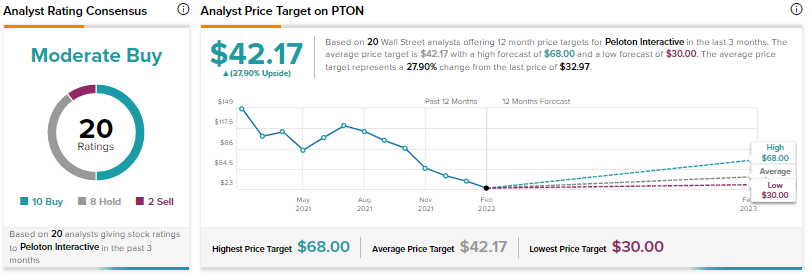Peloton Interactive (NASDAQ: PTON), the beleaguered exercise bike company, announced a slew of management changes and a major business overhaul today, in addition to its Fiscal Q2 results. Shares of the company jumped 10.8% in early morning trading following these announcements. The company stated in its letter to shareholders that John Foley, the company’s current Co-Founder and CEO, will be stepping down as CEO and will transition to Executive Chair.
Barry McCarthy will become the next CEO and President of Peloton, effective February 9. McCarthy has previously held senior leadership roles at Spotify (SPOT) and Netflix (NFLX) and will also join Peloton’s Board of Directors.
Besides these changes, the company also announced the appointment of two new Directors to its Board – Angel L. Mendez and Jonathan Mildenhall, while Erik Blachford, who has been on the company’s Board of Directors since 2015, will step down. In another move, William Lynch will transition from President of Peloton to a non-executive Director.
Foley, the current CEO, commented on this transition that Barry McCarthy was the “right leader to take the company into its next phase of growth. He’s not only recognized as an expert in running subscription business models and helping category-leading digital streaming companies flourish, but he has also had tremendous success in partnering with founder CEOs at other brands.”
Peloton’s Restructuring Program
Peloton also announced a significant restructuring plan “to position the business for long-term growth while establishing a clear path to consistent profitability and sustainable free cash flow.”
As a part of this restructuring, PTON will wind down its planned development of Peloton Output Park (POP). In May last year, the company had announced plans to build a manufacturing facility in Ohio to manufacture its connected fitness products at an investment of $400 million.
According to Peloton, this winding down of POP will result in a restructuring capex of $60 million. Not only that, but the company will also scale back its planned capex for FY22 by $150 million.
Besides this, the company will also reduce its owned and operated warehouses and delivery footprint while expanding its “commercial agreements with third party logistics providers.”
Furthermore, Peloton announced downsizing of its workforce with reduction of around 2,800 global positions with corporate positions being reduced by around 20%.
This extensive restructuring program is expected to result in incurring $130 million in cash charges related to severance, as well as other exit and restructuring activities and non-cash charges of $80 million.
With the slew of cost cuts and restructuring, Peloton plans to achieve annual run-rate cost savings of $800 million.
Fiscal Second Quarter Results
The company had already announced preliminary Fiscal Q2 results late last month. In Q2, Peloton’s total revenues grew 6% year-over-year to $1.1 billion, in line with Street estimates of $1.1 billion. The company cratered to a loss in Q2 with a net loss of $439.4 million or a loss of $1.39 per diluted share versus a net income of $63.6 million in the same period last year.
Analysts were anticipating a loss of $1.21 per share in Q2.
At the end of Q2, PTON’s Connected Fitness subscriptions were up 66% year-over-year to 2.77 million while paid digital subscriptions rose 38% year-over-year to 862,000.
Peloton generates most of its revenues through the sale of its connected fitness products including Bike+, Peloton Bike, Tread+, and the Peloton Tread, and recurring subscription revenue associated with these products.
FY22 and Q3 Outlook
PTON anticipates 2.93 million Connected Fitness Subscriptions at the end of Q3 and expects to earn revenues between $950 million and $1 billion. The company has projected adjusted EBITDA to range between a loss of $140 million and $125 million.
At the end of FY22, the company has projected Connected Fitness Subscriptions of 3 million, while revenue is expected to be in the range of $3.7 billion to $3.8 billion. This is below consensus Street estimates of FY22 revenues of $4.26 billion.
Wall Street’s Take
Following this business overhaul, J.P. Morgan analyst Doug Anmuth believes that the new CEO will be cheered by the Street and will prove to be a positive move for PTON’s shares both over the near term and the long term.
The analyst added that the new CEO will provide a “steady hand” to the company as it tries to elevate the demand for its products while trying to steer its business towards profitability.
Anmuth remained upbeat with a Buy rating and a price target of $50 (approximately 59% upside) on the stock.
Other analysts on the Street are cautiously optimistic about PTON with a Moderate Buy consensus rating based on 10 Buys, 8 Holds, and 2 Sells. The average Peloton stock prediction of $42.17 implies upside potential of approximately 27.9% to current levels for this stock.

Download the TipRanks mobile app now.
To find good ideas for stocks trading at attractive valuations, visit TipRanks’ Best Stocks to Buy, a newly launched tool that unites all of TipRanks’ equity insights.
Read full Disclaimer & Disclosure.

